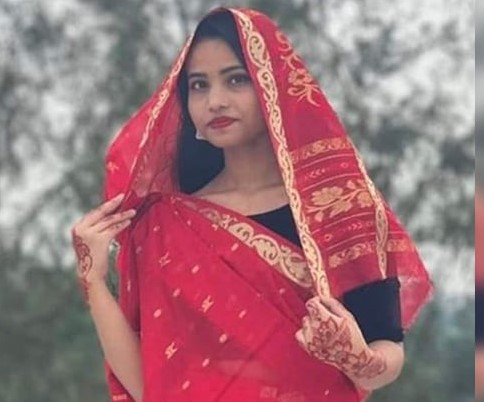Nasima Akhter, a 24-year-old young woman, had come to Dhaka in July last year to visit her elder brother’s family in the Science Lab area, Dhanmondi Road No. 1.
Little did she know that her visit would coincide with a period of intense political unrest. Science Lab had become a battleground, a central point of clashes between the protesters and law enforcement, with daily confrontations marking the streets.
Nasima, who was there for a brief stay, had no way of knowing that her peaceful visit would take such a tragic turn. On July 18, her nephews, who were actively participating in the protests, returned home after being injured.
The family stayed inside the house the following day, isolated from the outside world due to an internet shutdown. They spent their time peeking through the windows and occasionally going up to the rooftop, trying to observe the unfolding events outside.
It was on July 19 that Nasima’s life would tragically be altered. In the afternoon, the sounds of helicopters filled the air, a constant reminder of the escalating tension in the streets. Tear gas and rubber bullets rained down from the helicopters, targeting the protestors across various parts of Dhaka. Nasima and her family were exposed to the fumes of the tear gas as they watched the chaos unfold from their rooftop.
As the evening settled, with the situation appearing to calm down, Nasima’s elder nephew suggested to his younger brother, “Let’s go up to the rooftop and see what’s happening around Science Lab.” With a mix of curiosity and concern, they headed up, and Nasima, too, followed them. But within moments of stepping onto the roof, disaster struck.
Bullets fired from a distance hit her nephew first, and before he could react, another bullet found its mark in Nasima’s neck. She collapsed instantly, face down on the rooftop. Her nephew, gasping for breath, ran inside, barely managing to say, “Mum, I’ve been shot.” His words were the last he spoke before he lost consciousness.
The house was thrown into chaos. Rehana Akhter, Nasima’s sister-in-law, was tending to her son’s injuries when she was suddenly told that Nasima, too, had been struck by gunfire. Panic set in as Rehana called for help, and the driver quickly rushed them to Popular Hospital.
Both Nasima and her nephew were admitted to the ICU. Though her nephew survived the night, Nasima’s injuries were too severe. The bullet had torn through her esophagus, and she passed away the following day, leaving her family heartbroken.
Nasima’s body was taken back to her family home in Maijdee, Noakhali, where she was laid to rest in the family graveyard in the village of Monpura. Her death came as a devastating blow to her family, who had seen the young woman grow up with dreams of education and a peaceful life.
Nasima had studied in Madrasa until class eight but couldn’t continue her education further. As the youngest of four sisters and three brothers, Nasima’s life had just begun to blossom when it was cut tragically short. She was a daughter, a sister, a niece—someone full of potential, whose life was claimed by the same violence that claimed the future of so many others in the fight for justice.
Her story is a reminder of the high cost of political unrest, where the innocent is often caught in the crossfire. Nasima Akhter, a young woman with dreams, was not just a casualty of the uprising; she was a symbol of the senselessness of violence in a world where change comes at a heavy price.


